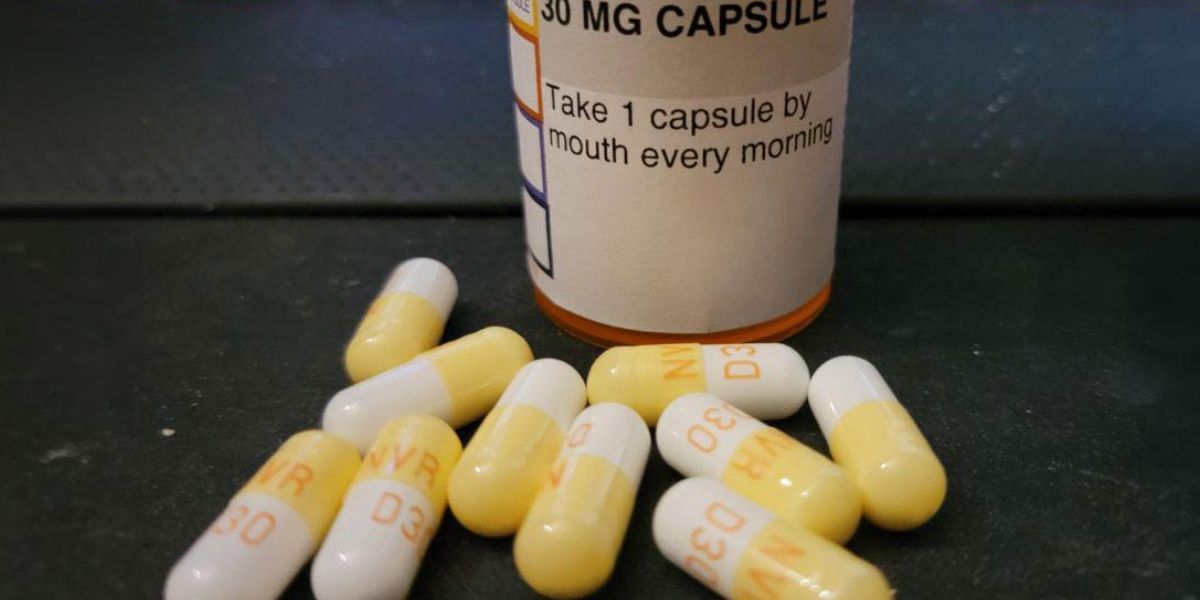Focalin XR and Focalin Addiction and Abuse


Focalin, a medication commonly prescribed to treat attention deficit hyperactivity disorder (ADHD) and narcolepsy, has proven effective in managing symptoms. However, it also carries a high potential for abuse and addiction.
It’s important to understand the risks of using Focalin. These risks include side effects and signs of Focalin addiction. This information is crucial for anyone taking or considering this prescription medication.
This article discusses the uses of Focalin and its extended-release version, Focalin XR. It also covers the side effects of Focalin and the risks of abuse and addiction. It also provides insight into effective addiction treatment options available at White Oak Recovery Center.
What Is Focalin?
Focalin is a central nervous system (CNS) stimulant medication commonly prescribed for treating ADHD and narcolepsy. Focalin’s active ingredient is dexmethylphenidate, which boosts brain chemicals to enhance attention and focus. Focalin is available in both immediate and extended-release formulations, allowing for flexibility in managing ADHD symptoms.
Dexmethylphenidate, the main ingredient in Focalin, is a Schedule II controlled substance, indicating a high potential for abuse and addiction. It works by affecting neurotransmitters in the brain, which can help enhance concentration and reduce impulsivity in people with ADHD.
Focalin is a brand name for this medication, which has been FDA-approved for treating ADHD in both children and adults. Doctors typically recommend a starting dose of 2.5 MG for children, which they can adjust based on response and tolerance. This medication is often used as part of a comprehensive treatment plan that includes behavioral therapy and educational interventions, providing a holistic approach to managing ADHD.
Focalin XR
Focalin XR is an extended-release version of the medication designed to provide longer relief from the disorder throughout the day. The extended-release pill can be taken once a day, making it easier for people who need long-lasting symptom relief.
Focalin XR is popular because it helps maintain steady medication levels in the blood. This means that fewer doses are required throughout the day. This extended-release mechanism helps manage symptoms more effectively and improves treatment regimen adherence.
The usual starting dose for ADHD is 10 MG once a day in the morning, but it may change depending on how you react. It’s essential to follow the prescribing doctor’s recommendations to ensure safe and effective use of the medication
Focalin XR can also be used off-label for managing symptoms of narcolepsy in addition to treating ADHD. This condition, characterized by excessive daytime sleepiness and sudden episodes of muscle weakness, can benefit from the stimulating effects of dexmethylphenidate. Narcolepsy treatment often requires a multifaceted approach, including lifestyle changes and sometimes additional medications to regulate sleep patterns.

Focalin Side Effects
Like all medications, Focalin can cause side effects. Common side effects include:
- Loss of appetite
- Stomach pain
- Weight loss
- Insomnia
- Dry mouth
- Dizziness
- Nervousness
- Numbness pain in fingers or toes
More severe side effects may occur, especially at high doses or with prolonged use. These can include:
- Increased blood pressure
- Rapid heart rate
- Chest pain
- Mood changes, including mood disorders and bipolar disorder
- Risk of heart attack
It’s crucial to monitor for any adverse effects and report them to a healthcare provider. People with bipolar disorder should be cautious when using Focalin. The medication has the potential to exacerbate their symptoms.
People with mental health issues need to be mindful of how certain medications may affect them. It is important to have regular check-ups with the doctor who prescribed Focalin. This will help monitor how well the medication is working and make any necessary changes to the dosage.
Inform your doctor about all your medications, including over-the-counter drugs and supplements.
Focalin may interact with these medications. This can help prevent potentially dangerous interactions and ensure the safe use of this prescription drug. In some cases, adjusting the timing of doses or choosing alternative medications may be necessary to avoid adverse interactions.
Focalin Addiction and Abuse
Focalin has a high potential for abuse and addiction, particularly when used in ways not prescribed by a healthcare provider. Abuse can lead to serious health risks, including:
- Increased tolerance, requiring higher doses to achieve the same effects
- Physical dependence leads to withdrawal symptoms when the medication is stopped
- Psychological dependence, where people feel they cannot function without the drug
Focalin can lead to substance use disorders characterized by compulsive drug-seeking behavior and use despite harmful consequences. Some people misuse Focalin by taking too much.
Some people crush and snort it and use it without a prescription to improve their performance in school or sports. This type of misuse is particularly dangerous as it significantly increases the risk of overdose and severe health complications.
The risk of addiction is higher in people with a family history of substance abuse or mental health disorders. Quitting Focalin can be tough because of withdrawal symptoms like tiredness, feeling down, and changes in appetite. It’s important to have support when trying to stop. Early intervention and support are crucial in preventing the progression from misuse to full-blown addiction.
Signs of Focalin Abuse
Recognizing the signs of Focalin abuse can help in seeking timely intervention and support. Some common signs include:
- Taking higher doses than prescribed or more frequently
- Doctor shopping to obtain multiple prescriptions
- Neglecting responsibilities at work, school, or home
- Social withdrawal and isolation
- Changes in mood and behavior, including aggression or irritability
- Financial problems due to spending money on obtaining the drug
Other signs may include often complaining about physical issues like headaches or stomach pain to get more medication. Sudden changes in how well you do in school or work and in who you hang out with can show substance abuse.
Long-Term Effects of Focalin Abuse
Long-term abuse of Focalin can lead to severe health complications, including:
- Cardiovascular issues such as increased blood pressure, rapid heart rate, and risk of heart attack
- Mental health disorders, including anxiety, depression, and mood disorders
- Cognitive impairment and memory problems
- Social and relationship difficulties
- Legal and financial troubles
It’s important to address Focalin abuse early to prevent these long-term consequences and support people in their journey to recovery. Long-term health monitoring and psychological support are often necessary to manage the lasting effects of prolonged substance abuse.

Focalin Addiction Treatment at White Oak Recovery Center
We know how tough Focalin addiction can be. That’s why we offer personalized treatment programs at White Oak Recovery Center. Our approach to addiction treatment includes:
Medical Detox:
Medically supervised detox is a process to manage withdrawal symptoms and ensure safety and comfort during the initial phase of recovery. This phase is critical in clearing the body of the substance and stabilizing the patient.
Therapeutic Interventions:
Therapy sessions help individuals and groups with addiction focus on the mental aspect. The sessions also assist in developing strategies to maintain sobriety in the future. The goal is to provide support for long-term recovery.
Therapists often use cognitive behavioral therapy (CBT) therapy for thoughts in addition to other proven methods to help patients recognize and alter their addictive behaviors.
Medication Management:
This includes monitoring and adjusting medications to support recovery and manage any co-occurring mental health disorders. This can involve using medications to help with withdrawal symptoms, cravings, or mental health issues in a treatment program.
Holistic Therapies:
These therapies incorporate holistic approaches such as yoga, meditation, and nutrition counseling to promote overall well-being and healing. These therapies can help address the physical and emotional aspects of addiction, providing a balanced approach to recovery.
Aftercare Planning:
Aftercare planning involves developing a personalized aftercare plan to support ongoing recovery and prevent relapse, including continued therapy, support groups, and outpatient services. Aftercare is crucial to recovery, helping people maintain sobriety and rebuild their lives.
White Oak Recovery Center helps you overcome addiction and reclaim your life with compassionate and evidence-based care. Our team of healthcare professionals works together to address all aspects of addiction, providing comprehensive and effective treatment.
Reach out to one of our caring treatment specialists to discuss your treatment options. Overcoming substance use and starting a life rooted in recovery is achievable.

Am I covered for addiction treatment?
Your insurance may cover treatment. Call now for an entirely free and confidential assessment. Recovery starts with a phone call.

- Moen, Marit D., and Keam, Susan J., “Dexmethylphenidate Extended Release: A Review of its Use in the Treatment of Attention-Deficit Hyperactivity Disorder.” CNS Drugs, Dec. 2009.
- “Medication Guide: Focalin XR.” Novartis Pharmaceuticals Corporation, Oct. 2023.
- “Dexmethylphenidate.” MedlinePlus: National Library of Medicine, Apr. 2019.
- “Focalin XR (Dexmethylphenidate Hydrochloride) Extended-Release Capsules CII for Oral Use.” US Food and Drug Administration (FDA), Dec. 2010.
Medical Disclaimer:







